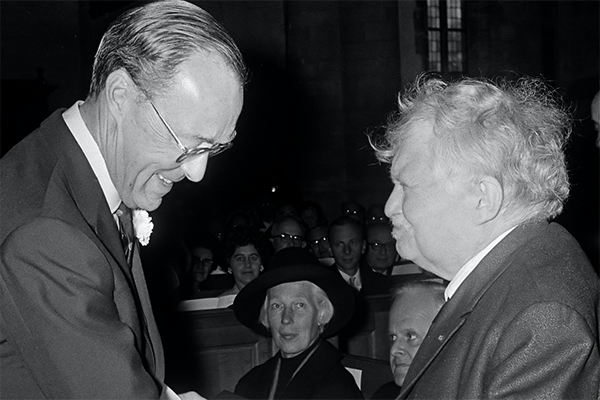
Oct. 27, 1969. (Photo: Nationaal Archief, CCO)
Around the middle of March, I received in the mail the issue of America magazine (March 16th, 2020) containing the essay on existentialist philosopher Soren Kierkegaard, which I discussed in the last three columns. I also received an issue of Commonweal magazine (March 20, 2020) that had an essay on the personalist Gabriel Marcel.
Even though my birthday is not in March, these two essays were like special gifts to me. I greatly admire Kierkegaard, especially for his view of freedom, and I greatly admire Marcel, especially for his view of love. In fact, with the exception of Thomas Aquinas, Marcel is my favorite philosopher. Though I have been teaching the philosophies of Kierkegaard and Marcel for many years, I learned new facts about both thinkers from the essays.
When I was a young professor of philosophy and just beginning to read Marcel’s philosophy, I thought his insights were marvelous but his writing style made his philosophy unnecessarily difficult to understand. One of the projects I set myself was to rewrite Marcel’s philosophy texts so that they might be more available to those readers who had little background in reading philosophy. That was a project I never undertook. However, I wonder how many of Marcel’s insights have appeared in these weekly
columns and in books I have written without me being aware that I was borrowing from my favorite philosopher.
The essay about Marcel in Commonweal, entitled “From Problem to Mystery,” was written by Steven Knepper. In the essay, Knepper reports that in 1914 during World War I the Red Cross received desperate inquiries about soldiers who were missing. The 24-year-old philosopher and playwright Mar-
cel was the director of the Red Cross information service in Paris. Knepper suggests that this experience of informing loved ones about the missing soldiers had an impact on Marcel that profoundly influenced his thinking about the mystery of the human person. Knepper writes the following:
“The missing soldier became a variable in a formula derived from a catalog data. On another level, though, Marcel’s position entailed personal encounters. Whenever Marcel told parents their son was dead, it was painfully clear that the soldier was not a variable but a singular human being. Marcel had
not solved the problem of the missing soldier for the parents. Even if his news brought an element of closure, the loss remained a ‘mystery’ that would last for the rest of their lives.” (p. 20)
Perhaps the most direct way to begin a consideration of Marcel’s philosophy is by considering Marcel’s distinction between a problem and a mystery because it is at the heart of Marcel’s thought. The French personalist-existentialist claimed there were four differences between a problem and a mystery. A problem did not directly include the personal self. So a computer that does not work, an automobile that won’t start, a roof that is leaking, are problems. They do not directly include the self.
A mystery always involves the self. It is impossible to reflect on the mystery of God or the mystery of death or the mystery of love without thinking about your relationship with God or your own death or your own love relationships.
The second difference is that the mood is different. Considering a problem the mood is curiosity, considering a mystery the mood is awe or wonder. Third, there is, at least in principle, a final answer to a problem. So a computer expert or a mechanic or a roofer might be helpful in solving some problems. There is no final answer to a mystery.
The obvious question is: If you know that there is no final answer to a mystery, why bother reflecting on a mystery?
The reason mysteries should be thought about is that there is nothing more important than a mystery and also that you can enter more and more deeply into a mystery and grasp more and more meaning. One author compared a mystery to a freshwater well. Noting that the more deeply you drank from the well, the better the water tasted and there was no end to the water, he claimed that with a mystery you can reflect more and more deeply and grasp more and more meaning while never completely comprehending the mystery.
Another comparison he offered was that reflecting on a mystery was like walking down a corridor in a museum that had beautiful paintings on the walls at each side. The further you walked, you passed paintings that were more beautiful than those you had already passed and there was no end to the corridor.
I find students at St. John’s University very responsive to Marcel’s philosophy. Studying Marcel’s philosophy is, I believe, an opportunity to know yourself better and to know God best.
Father Lauder is a philosophy professor at St. John’s University, Jamaica. He presents two 15-minute talks from his lecture series on the Catholic Novel, every Tuesday at 9 p.m. on NET-TV.

Fr Lauder,
I was a Philosophy srudent of yours at Cathedral College, graduating in 1971. You brought in Professor John Mc Dermott as a guest instructor for one of ypur classes. He had a profound effect on my outlook on life.
Your columns each week in the. Tablet are stimulating and thought provoking. I hope to read them for many years to come. Thank you.
All the best!